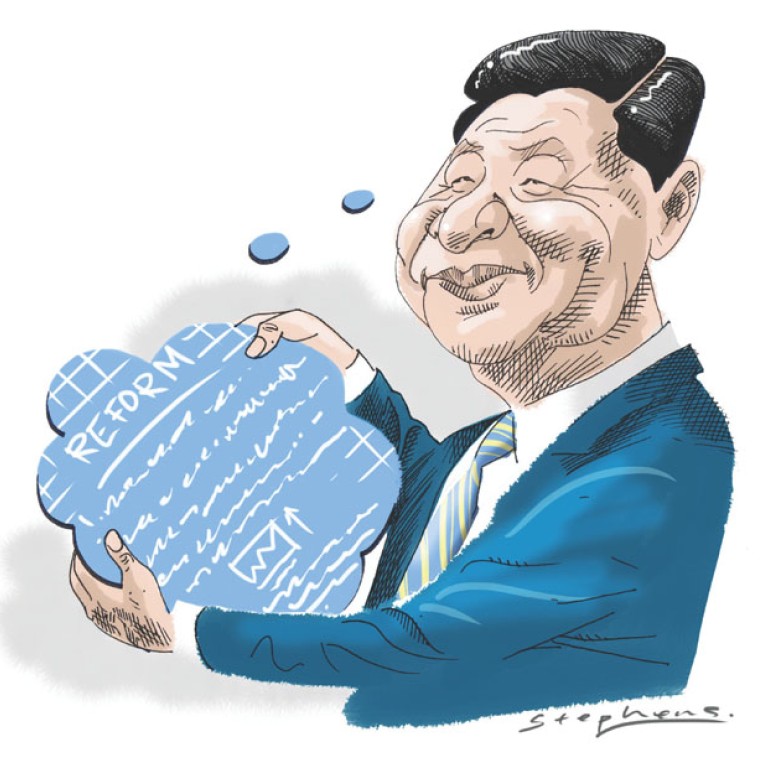
Reform blueprint underscores Xi Jinping's transformative vision
Robert Lawrence Kuhn believes the Chinese leadership, led by a determined Xi Jinping, did not get the credit it deserves for a wide-ranging reform blueprint that can be truly transformative
The Communist Party's third plenum is history - figuratively in that the crucial conclave has concluded and we have the results, and literally in that the transformative vision is truly historic.
In his explanatory address to the party's Central Committee, President Xi Jinping said: "We must waste no time in deepening reform in important areas with even greater political courage and wisdom, firmly do away with all ideological concepts." He stressed that "the development of practice is boundless, liberated thoughts are boundless, reform and opening up are boundless as well; there is no way out in pausing and withdrawing, reforming and opening up only has a progressive tense, not … a perfect tense." These are the strongest words of reform in a generation, a public commitment that sets a high bar to assess policies.
The list of reforms is stunning - any one of which, by itself, would be significant: a "decisive role" for the market in allocating resources, facilitating small and mid-sized firms, state-owned enterprise changes; market pricing of commodities; financial liberalisation of interest rates, reducing capital account restrictions enabling cross-border investments; the China (Shanghai) Pilot Free Trade Zone; fiscal structural reform (including reducing revenues from land sales), local government reform; integrated systems for urban and rural development, rural land reform, improving migrant workers' rights; enhancing consultative democracy, increasing public evaluations and feedback mechanisms; judicial system reform; strengthening anti-corruption mechanisms; increasing environmental protection; relaxing the one-child policy; eliminating labour camps; etc. For a major nation, the change-making is remarkable.
While implementation is multifaceted and will take years, the third plenum's decisions and directives, given their public prominence, make China's leaders overtly accountable, especially when government moves are tracked and dissected on social media. Enlightened leaders welcome such accountability.
Future historians may assess the third plenum of the 18th Central Committee as a milestone, much as they do the third plenum of the 11th Central Committee in 1978, when Deng Xiaoping initiated China's reform and opening up. No one ever underestimates the axial significance of Deng's changing China's focus from ideological struggle to economic development. Likewise, no one should underestimate the metamorphic complexity of Xi's changing China across a broad spectrum of economic, social and governmental sectors.
Given the breadth of its reform agenda, I cannot help but notice a bias in how the third plenum was reported in the international media. When the initial communiqué was issued at the close of the meeting, many foreign journalists criticised what they judged to be its "soft generalities", which, in their way of thinking, betrayed an adherence to the status quo and mere lip-service to reform - a disappointment, bad news. Yet only a few days later, when the full report was released, everyone realised that the policy decisions enacted were sweeping and substantive - a surprise, good news.
Yet foreign media reports did not report the good news of specific reforms as prominently as they had the "bad news" of generalised reforms, even though the good news was more unexpectedly good than the "bad news" had been unexpectedly bad.
Why? Why is "bad news" about China deemed more newsworthy than "good news"? As with much about China, no one reason suffices. Foreign media do not conspire to criticise China disproportionally, but there is an intrinsic media bias that distrusts all powers and all governments, and that the more powerful the government, the deeper the media distrust.
There is also a prejudicial belief in the superiority of the Western political system of multiparty elections such that any reforms that are not political reforms moving towards the Western model are not "real reforms". The fact that Xi is a transformative, pragmatic reformer like Deng, and not a chaotic political reformer like Mikhail Gorbachev, cannot be easily processed by a Western mindset.
What about the strengthening of China's political system and enhanced concern for domestic stability, as exemplified by the third plenum establishing a national security council?
China's leaders, led by Xi, are responsible for advancing China's development, and at this critical stage they must alter the industrial model from cheap labour to higher value-added production (which is required to pay workers higher wages and reduce severe social imbalances). Only the market can effect this fundamental shift efficiently; it cannot work via top-down government decree, no matter how enlightened.
Hence, with the market now playing a "decisive role" in the economy, by definition, government controls are reduced - which, under certain circumstances, could fragment society and engender instability. Given China's huge population and imbalanced social development, the multiple risks of relaxing political controls while at the same time freeing market forces are deemed too dangerous.
It is a tribute to Xi's leadership how, in such a short period of time, these multi-farious and far-reaching policies could be assembled, researched, positioned, floated, tested internally, opinionised, harmonised and revised multiple times. In April, the Politburo, led by Xi, decided that the third plenum would focus on "comprehensively deepening reform". It sought broad input by soliciting diverse opinions inside and outside the party. A document-drafting group conducted research, and based on information-driven results, produced numerous revisions to the resolution. During the course of this deliberate process, the Politburo Standing Committee met three times and the Politburo twice.
The result is a blueprint for China's future. It does not guarantee success or underestimate the difficulties ahead, but it does define what China's leaders now mean by success and it evinces their resolve. Simply put, the resolution of the third plenum provides substance and substrate for President Xi's Chinese dream.

